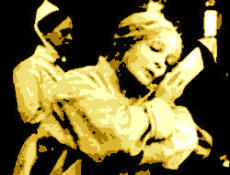Film Review
Victor Sjöström, one of Sweden's leading film directors
during its brief but stunning 'golden age', is best remembered for his
late masterpieces,
The Phantom Carriage (1921) and
The Wind (1928), but his early
films are just as worthy of attention for their authenticity and
technical innovation. Made in 1913,
Ingeborg Holm (a.k.a.
Margaret Day) was one of
Sjöström's earliest films, a harsh but intensely poignant
social drama that offered the most heartfelt condemnation of the lack
of social provision in Sweden of the 1910s. The film provoked a
far-reaching debate in the country that led to a substantial reform of
the poor laws, paving the way for the introduction of a system of
social security which many other countries around the world ended up
emulating.
Sjöström's films are distinguished by an unerring sense of
realism, which arises from authentic character portrayals and the use
of natural locations, primarily the raw Swedish landscape, to define
the protagonists and anchor them in what is instantly recognisable as
everyday reality. The opening sequences in
Ingeborg Holm depicting happy
scenes of family life are indistinguishable from documentary, with
small children wandering about the set like stray kittens, seemingly
oblivious to the fact they are in a film. Sjöström
conceals the story's theatrical origins admirably (it is taken from a
play written seven years earlier by Nils Krok) and even in its most
melodramatic moments thse film never ceases to be staggeringly truthful,
a template for social realist dramas of subsequent decades.
The film owes much of its authenticity to the lead actress Hilda
Borgström. Her compelling portrayal of the eponymous mother,
whose life is completely ripped to shreds by a series of personal
misfortunes, is a master-class in subtlety and restraint for a film of
this era. One sequence that stands out is the one in which
Ingeborg is separated from her eldest son. As the boy is taken
away by his foster mother, leaving his mother standing disconsolate at
the entrance of the workhouse that has become her life's prison, he can
barely avoid turning away from her. To spare her son pain, the
wretched mother rushes into the building as soon as his back is
turned. The son turns again, but his mother has gone, so he
allows himself to be led away. The moment he has passed through
the gates, Ingeborg steps back outside, hoping to catch a last glimpse
of her son, but he is gone. The emotion of the parting finally
overwhelms the mother and she collapses in a dead faint. It is
hard to recall a film in which there is a scene of such naked
poignancy as this.
The power of
Ingeborg Holm
comes not from its incredibly moving story but from
Sjöström's doggedly simple rendering of it. There is
none of the rhythmic editing or aggressive crosscutting that the
director employs on later films. There aren't even any close-ups
or tracking shots. The whole film consists of long static takes
which create a kind of Bretchtian separation between the spectator and
the protagonists, something that can only heighten the emotional
experience of watching the film. Had the film been made in
Hollywood a few years later it would doubtless have employed all the
devices available to tease out as much emotionality as possible - long,
lingering close-ups, overly sentimental music, excessively maudlin
dialogue, etc. The result would have been synthetic mush, with
none of the genuine, heart-wrenching poignancy that Sjöström
manages to pour into every frame of his film.
Ingeborg Holm is effective because
it is so brazenly simple, and today's filmmakers can learn a great deal
from how this masterpiece of cinematic understatement gently works on
our feelings and compels us to share the unimaginable emotional journey
of a woman who loses everything that is dear to her. The film
deserves to be embraced as one of the landmarks of the silent era, for
it is surely one that will break your heart.
© James Travers 2014
The above content is owned by frenchfilms.org and must not be copied.
Film Synopsis
Sven and Ingeborg Holm are a happily married couple with three young
children. By scrimping and scraping they have saved enough money
so that, with the help of a loan, they can open a small grocer's shop
in Stockholm. Just when things are going so well disaster
strikes. Sven suffers a pulmonary haemorrhage and becomes
bedridden. A short while later he dies, and Ingeborg's attempts
to keep the shop going end in dismal failure. Unable to work
because of a stomach ulcer, Ingeborg turns to the poorhouse for
help. Her only option is to sell everything she has, give her
children away to foster families and take up permanent residence in the
poorhouse. Later, the manager of the poorhouse receives a letter
from the foster parents of Ingeborg's daughter Valborg notifying him
that the little girl has fallen seriously ill. When she learns
that the manager has no intention of paying for Valborg's medical
treatment, Ingeborg escapes from the poorhouse and attempts to reach
her daughter. She arrives too late and ends up being taken back
to the poorhouse by the police. Some time later, Ingeborg is
allowed to see her youngest son, but he fails to recognise her.
This last calamity drives the young woman out of her mind...
© James Travers
The above content is owned by frenchfilms.org and must not be copied.



